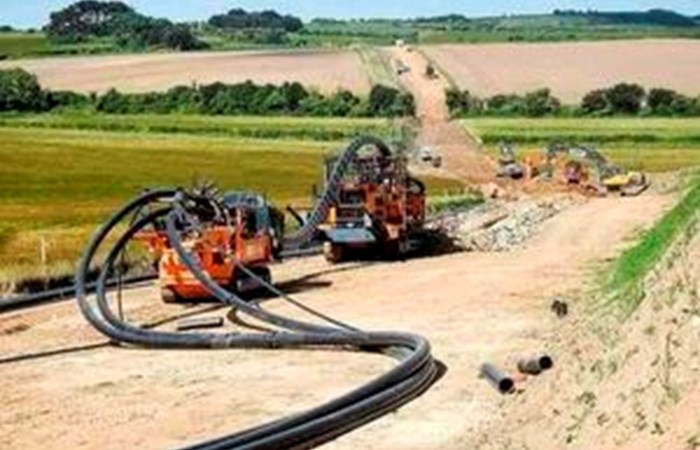Department for Transport

The Infrastructure Bill would provide a 3.9 billion boost to the economy over the next 10 years by:
- improving the funding and management of our major roads
- streamlining the planning process for major projects
- protecting our infrastructure from invasive plants and animals
- supporting house building
- making it easier and cheaper to register land and property
- helping communities become stakeholders in renewable electricity projects
- maximising the recovery of oil and gas from the UK continental shelf
- simplifying underground access procedures for the shale and geothermal energy industries
The bill and its supporting documents are on the Parliament website.
The main elements of the bill are:
Roads
The bill would turn the Highways Agency into a government-owned company. It would also provide for stable, long term funding for national strategic road infrastructure projects, to create and repair the motorways and major A routes that support the economy. It would create units within Passenger Focus and the Office of Rail Regulation to represent the interests of road users and to monitor the companys performance. The response to consultation on these measures was published in April 2014. We conducted an impact assessment on these measures and considered the case for the creation of an arms-length body. Further information about the governance arrangements for the government-owned company was published in June 2014.
Cycling and walking
The bill would place a commitment on the government to produce a Cycling and walking investment strategy. The strategy would specify the objectives to be achieved and the financial resources to be made available.
British Transport Police
The bill would allow the British Transport Police to obtain driver information and so enforce against individuals committing road traffic offences on the railways.
Invasive non-native species
The bill would provide more power to control the invasive, non-native species that pose serious threats to biodiversity, the water environment and infrastructure. This was one of the measures looked at by the Law Commission consultation paper on wildlife law in 2012, and their subsequent report of February 2014.
Nationally significant infrastructure projects
The bill would simplify and speed up measures introduced in the Planning Act 2008 for handling minor changes to existing planning permissions for major projects. It would also simplify the processes for more significant changes.
The bill would allow the examining authority, a group of inspectors who consider major applications, to be appointed immediately after an application has been accepted. It would also allow the panel to comprise 2 inspectors, speeding up the process and saving money.
A briefing note on these measures has now been published. More details on changes being proposed to secondary legislation can be found in the nationally significant infrastructure section of the governments recent technical consultation on planning. The government has now published its response to this consultation.
Deemed discharge for certain planning conditions
The bill would allow certain types of planning conditions to be regarded as discharged if a local planning authority has not notified the applicant of their decision within a prescribed time period. This will reduce unnecessary delay and costs. The government response to the consultation on the procedural detail of this proposal has been published.
Mayoral Development Orders
The bill would enable the Mayor of London to provide leadership and work with London boroughs to tackle cross-boundary planning obstacles, unlocking more sites for development, including residential development.
Greater London Authority
The bill would allow the Greater London Authority (GLA) to fund transport elements of projects to build new homes or create new jobs in London.
Public sector land assets
The bill would permit land to be transferred directly from arms-length bodies to the Homes and Communities Agency (HCA). This would reduce bureaucracy, manage land more effectively, and get more homes built.
The bill would make sure that future purchasers of land owned by HCA and GLA will be able to develop and use land without being affected by easements and other rights and restrictions suspended by the agency. Sometimes land owned by HCA and GLA has easements or rights and restrictions from its previous use. At the moment HCA and the GLA can suspend these, but not pass that suspension on. The bill would make sure that purchasers of this land would also benefit from the suspension.
Land Registry
The bill would also allow Land Registry to take on statutory responsibility for the Local Land Charges register and an extension of powers would also allow Land Registry to play a wider role in the property market. The consultation, including impact assessment, on these measures took place between January and March 2014 and the response and updated impact assessment were published in June 2014 and October 2014 respectively.
Zero carbon homes
The bill would introduce measures to implement the governments drive towards zero carbon homes as described in its recent response to the consultation that took place in 2013. A consultation paper with proposals for an exemption from zero carbon provisions for small sites was published on 18 November 2014.
The community electricity right
The bill would create a reserve power to give communities the chance to buy a stake in new commercial renewable electricity schemes in their area. This community electricity right would allow communities to own a greater share of the financial benefits. We would only consider using this power if the voluntary approach to community shared ownership was unsuccessful.
Renewable heat incentive (RHI)
The bill would allow for changes to the RHI providing more flexibility in financing arrangements for renewable heating systems. This would, for example, allow households unable to afford a renewable heating system to have the cost met by a third party, who would then receive the RHI payments. The bill would also allow the RHI
